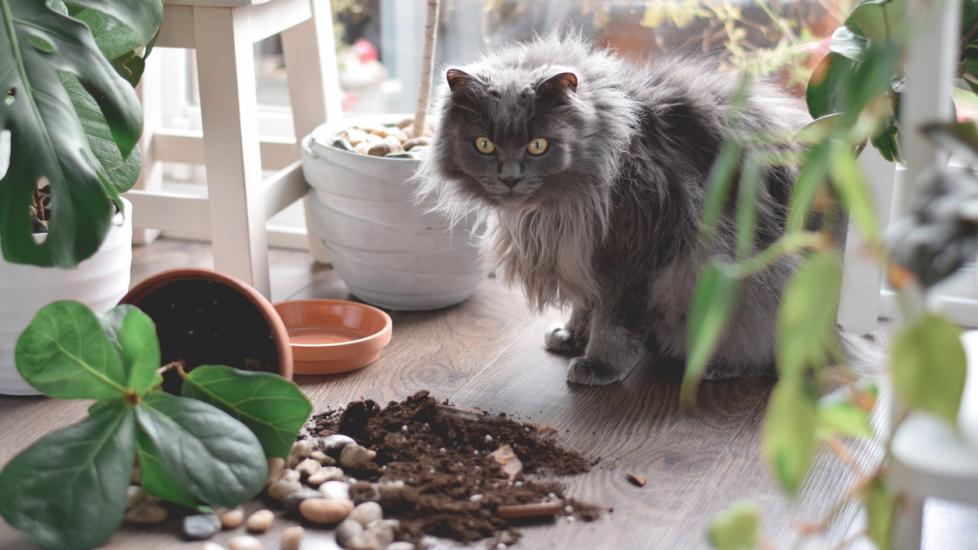Why Do Cats Knock Things Over?
iStock/JulieAlexK
Cat-lovers everywhere know the drill: Their cat is fixated on an object sitting on a counter, table, or desk. After a moment, a paw extends … and the item crashes to the floor as the cat intently watches the action.
This might seem like just another little quirk of our feline friends, but there are logical explanations for why cats knock things over.
Key Takeaways
- Cats knock things over due to instinct, boredom, or because it’s a learned behavior.
- Pet parents may unintentionally reinforce this behavior by responding when their cat knocks something over.
- Boredom is a major trigger, and environmental enrichment can help curb the behavior.
Why Do Cats Push Things off Tables?
Felines don’t do things just to do them. There are always reasons behind cat behaviors, and that includes knocking things over.
1. It’s Instinct
As predators, cats are hardwired to be attracted to things that dart past their line of sight. It’s instinctual: Fast-moving objects are potentially something to chase, catch, and eat.
The simple act of pushing or batting items off counters and desks plays to this instinct. This is also why cats love watching bugs and playing with quick-moving wand toys.
2. We’ve Reinforced the Behavior
No one loves their cat spilling a water glass onto the floor. But pet parents might be unknowingly reinforcing that behavior by talking to their cat or picking them up when they go up to bat.
Cats are quick learners; it doesn’t take long for them to figure out that when they begin pushing a glass closer to the table’s edge, their favorite people respond and give them attention.
3. Your Cat Is Bored
Bored cats who have little stimulation in their environment may find ways to entertain themselves. And when kitties are left alone for hours with nothing to do and no one to interact with, your trinkets will end up on the floor.
How To Stop Your Cat From Knocking Things Over
Before changing their behavior, identify the reasons your cat is knocking things off tables.
-
Look for patterns: When and where does your cat knock things over? Does it usually happen when you’re around? Does your cat act out when you’re not paying attention to them or when they’re hungry?
-
Watch how you respond: Does your kitty get attention when they act out? Do you feed, pet, or talk to them? Attention can be as subtle as glancing at the cat while they bat stuff off the table. Do you go put the item back, giving them the opportunity to knock it off again? You may be reinforcing your little attention-seeker’s behavior.
-
Check out your home from the cat’s perspective: Is there high, vertical territory for them to climb? Do they have cat toys they interact with? Propelling things off surfaces may be the most exciting activity your bored kitty is doing all day.
Once you understand the whys behind their actions, you can start working to change the behavior.
1. Manage the Environment
Be mindful of where your fragile items live. Instead of placing breakables in spots that are irresistible for your little feline hockey player, stash them in cupboards, cabinets, and areas they can’t reach.
2. Enrich the Space
Give your cat stuff to do that’s more fun than knocking things onto the floor. All cats need horizontal scratchers, scratching posts, and lots of toys that are more fun to box and chase than the stuff on your desk.
Tall cat condos and high-up cat shelves encourage cats to climb and exercise, and they’re also ideal places for a catnap. Placing a couple next to windows will keep your feline entertained so they can watch birds and bask in the sun.
3. Watch How You Respond
Don’t accidentally reinforce your cat’s behavior with attention when they swat your treasures off the table. Instead, before they jump on the desk or counter, proactively redirect their attention and give them stimulating things to do.
Throw toys and cat treats for them to chase. Make them work for meals by hiding treats and food on cat trees and in puzzle toys.
They need to have more fun with cat-appropriate toys than they’d have knocking over your water cup or potted plant. Essentially, keep them busy so they don’t feel the need to act out.
It’s not uncommon for cats to knock things over. But if that behavior turns into a problem, it’s possible to modify it.
